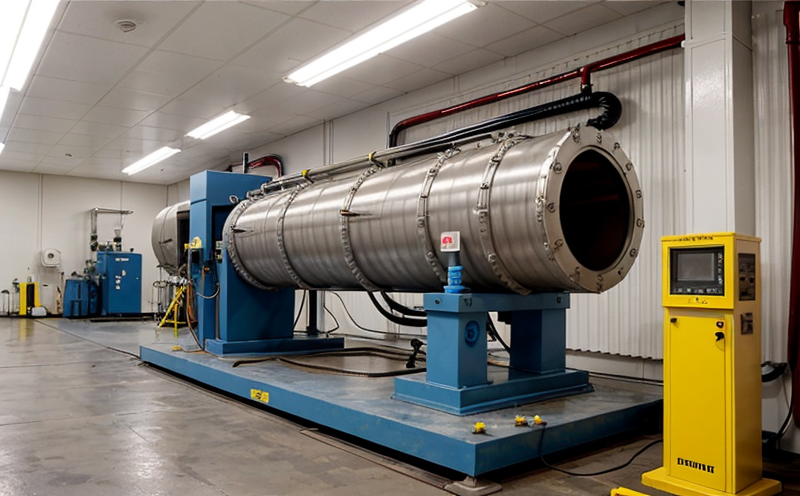ASTM C1452 Determination of Rare Earth Fission Products in Fuel
The ASTM C1452 standard provides a method to determine the concentration of rare earth fission products in nuclear fuel. This is critical for understanding the behavior and integrity of fuels used in nuclear reactors, particularly those that utilize thorium or uranium as fissile materials. The test focuses on identifying the presence of rare earth elements such as cerium, lanthanum, neodymium, samarium, europium, gadolinium, terbium, dysprosium, holmium, erbium, thulium, ytterbium, and lutetium, which are common fission products.
The process involves the dissolution of a representative sample of nuclear fuel into an aqueous solution. This is followed by a series of separations to isolate individual rare earth elements. The isolated species are then analyzed using inductively coupled plasma mass spectrometry (ICP-MS) or neutron activation analysis (NAA), both of which provide precise and accurate measurements.
The importance of this test cannot be overstated, as the presence and concentration of these fission products directly impact the fuel's performance, safety, and lifespan. High concentrations of certain rare earth elements can lead to corrosion or embrittlement of the nuclear fuel cladding, affecting its structural integrity. By identifying these elements early in the process, operators can make informed decisions regarding fuel management and reactor operation.
The ASTM C1452 method ensures consistency and accuracy across different laboratories by providing detailed procedural steps and quality control measures. This is particularly important in the nuclear industry where precision is paramount. The standard specifies the use of certified reference materials, which are essential for calibrating instruments and ensuring reproducibility.
Another critical aspect of this test is its role in compliance with international standards and regulations. Nuclear fuel testing must adhere to stringent guidelines set by organizations like the International Atomic Energy Agency (IAEA) and national regulatory bodies. ASTM C1452 helps ensure that laboratories meet these requirements, thereby maintaining a high level of trust within the industry.
The procedure also involves rigorous quality control measures such as inter-laboratory comparisons and proficiency testing programs. These activities help maintain the reliability and accuracy of test results across different facilities. By adhering to ASTM C1452, laboratories can ensure that their data is consistent with international standards, which is essential for regulatory compliance.
- Quality Control Measures: The use of certified reference materials (CRMs) ensures the accuracy and precision of test results. Regular inter-laboratory comparisons and proficiency testing programs further enhance reliability.
- Instrumentation: Precision instruments such as inductively coupled plasma mass spectrometers (ICP-MS) and neutron activation analyzers are crucial for accurate measurement of rare earth elements.
- Data Interpretation: Skilled analysts interpret the data, considering both quantitative and qualitative aspects to provide comprehensive insights into fuel composition.
Why It Matters
The determination of rare earth fission products is essential for maintaining nuclear safety and efficiency. Understanding these elements helps in optimizing fuel performance, extending reactor operation cycles, and ensuring that the fuel remains stable under operational conditions. Accurate knowledge of fission product concentrations can also aid in diagnosing potential issues early, preventing costly repairs or replacements.
From a broader perspective, this testing contributes to the development of safer and more efficient nuclear reactors. By reducing the risk of fuel failures, operators can extend reactor lifetimes, which is crucial for cost-effective energy production. Additionally, this information is vital for the design and evaluation of new fuels and materials that could potentially reduce waste generation and improve overall sustainability.
The results from ASTM C1452 are indispensable for quality managers, compliance officers, R&D engineers, and procurement personnel involved in nuclear fuel development and management. These professionals rely on accurate data to make informed decisions regarding fuel procurement, reactor operation, and future research initiatives. The insights gained from this test can lead to innovations that enhance the reliability of nuclear power generation.
The importance of ASTM C1452 extends beyond just safety; it also plays a key role in environmental stewardship by helping to minimize the environmental impact of nuclear fuel processing. By identifying and managing rare earth fission products, operators can work towards reducing waste streams and promoting more sustainable practices within the industry.
Eurolab Advantages
At Eurolab, we pride ourselves on delivering high-quality services that meet the stringent requirements of ASTM C1452. Our laboratories are equipped with state-of-the-art instrumentation and staffed by experienced analysts who have a deep understanding of nuclear fuel testing.
- Expertise: Our team of experts ensures that every test adheres to the latest standards and guidelines, providing accurate and reliable results.
- Compliance: Eurolab is committed to maintaining compliance with international regulations, ensuring that our testing meets all necessary requirements for nuclear fuel safety and efficiency.
- Quality Control: We implement rigorous quality control measures, including inter-laboratory comparisons and proficiency testing programs, to ensure the reliability of our results.
We understand the critical nature of this work and are dedicated to providing services that exceed expectations. Our clients can rely on us for precise and accurate determinations of rare earth fission products in nuclear fuel, ensuring they have the information they need to make informed decisions about their operations.
Quality and Reliability Assurance
- Certified Reference Materials: The use of certified reference materials ensures that all tests are conducted under controlled conditions, leading to consistent and accurate results.
- Inter-Laboratory Comparisons: Regular inter-laboratory comparisons help identify any discrepancies in testing methods or equipment, ensuring uniformity across different facilities.
- Proficiency Testing Programs: Participation in proficiency testing programs is mandatory for maintaining high standards of accuracy and reliability. These programs provide an additional layer of assurance that the results are trustworthy and reliable.
The combination of these measures ensures that our clients receive accurate, precise, and consistent test results every time. This commitment to quality control and reliability is what sets Eurolab apart in the nuclear fuel testing industry.





